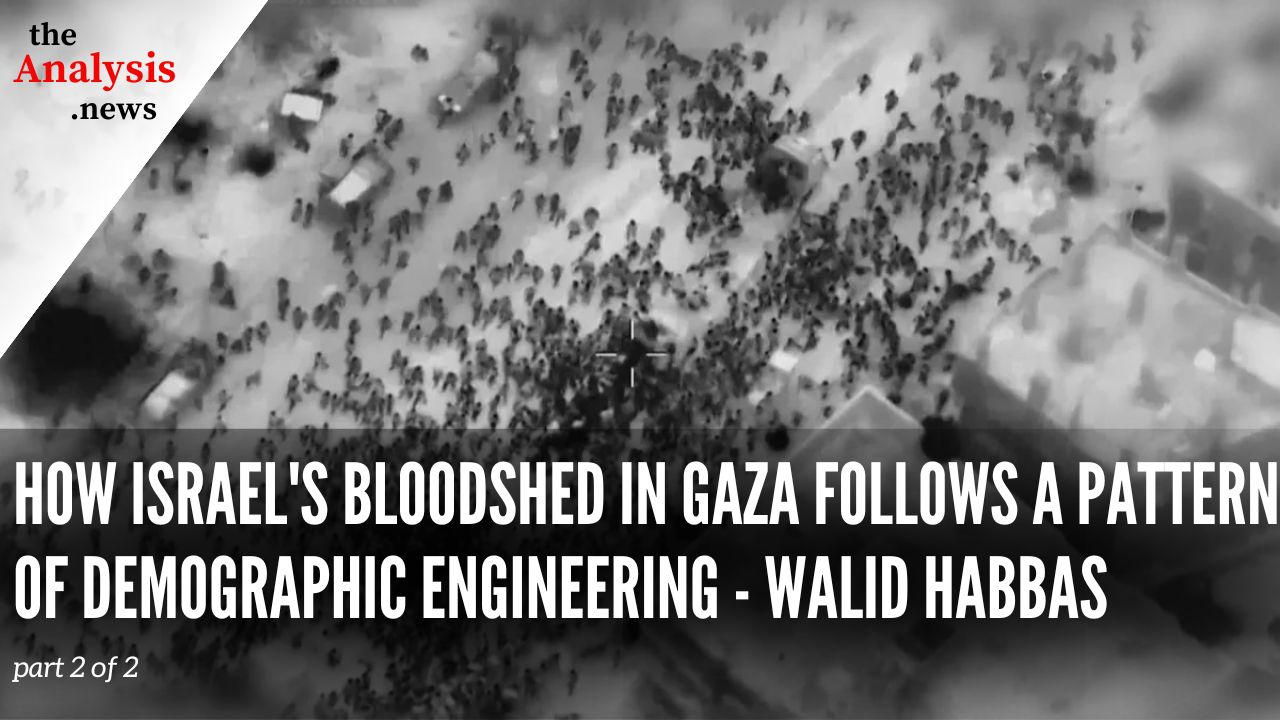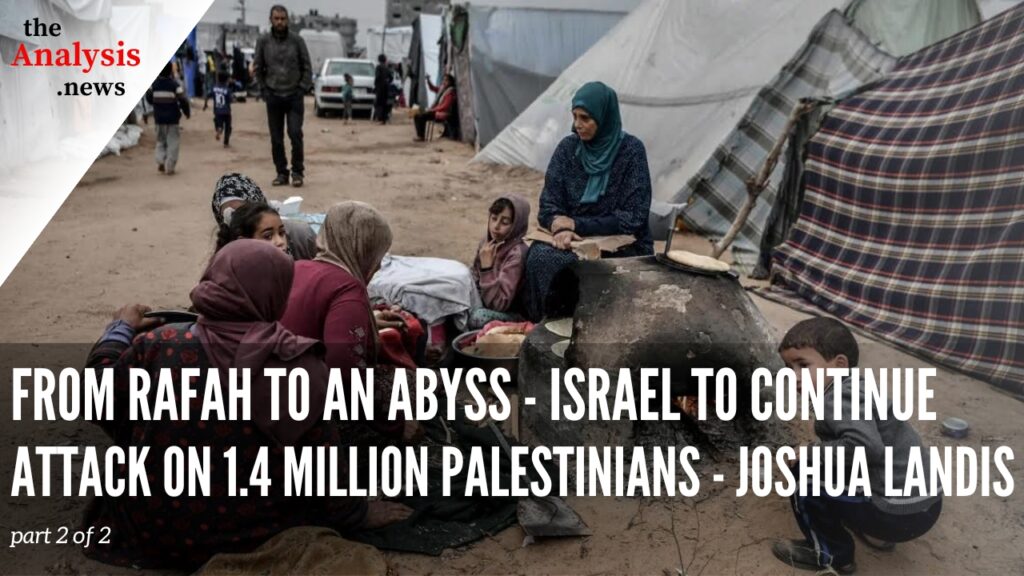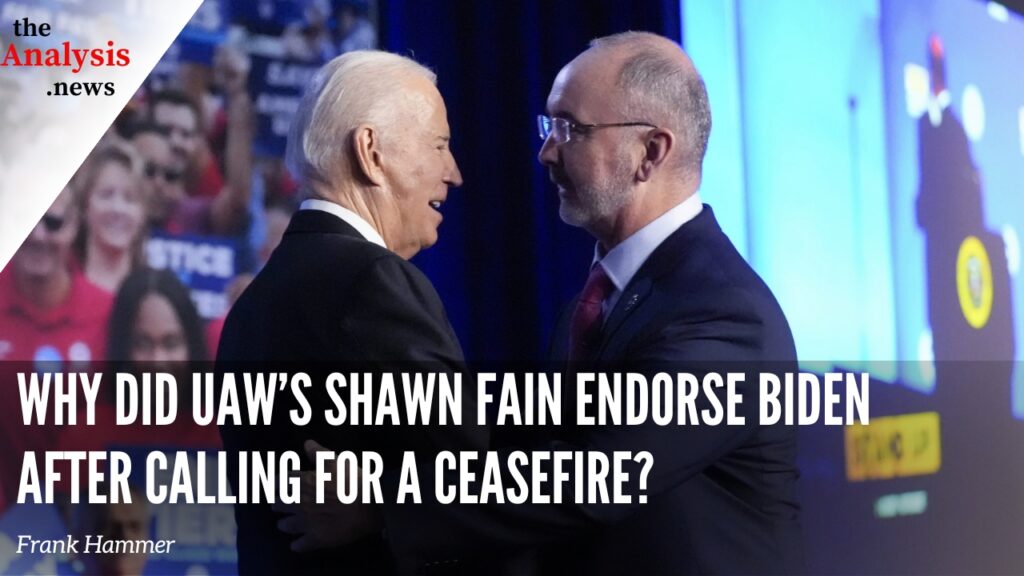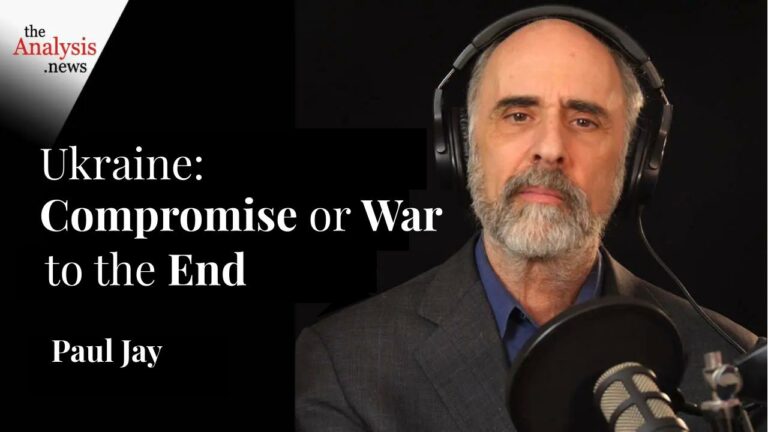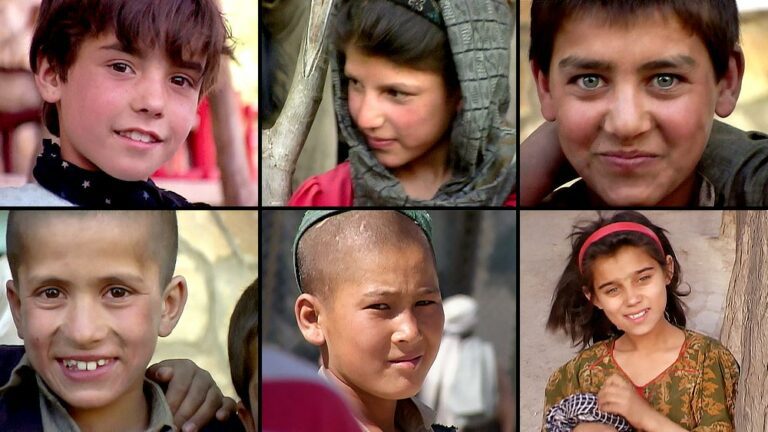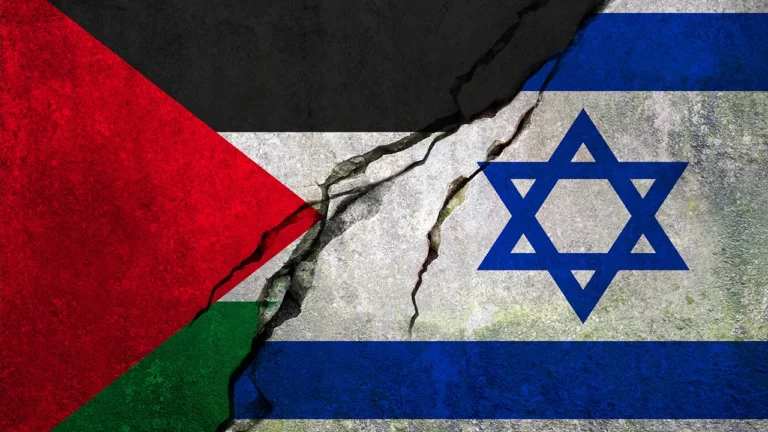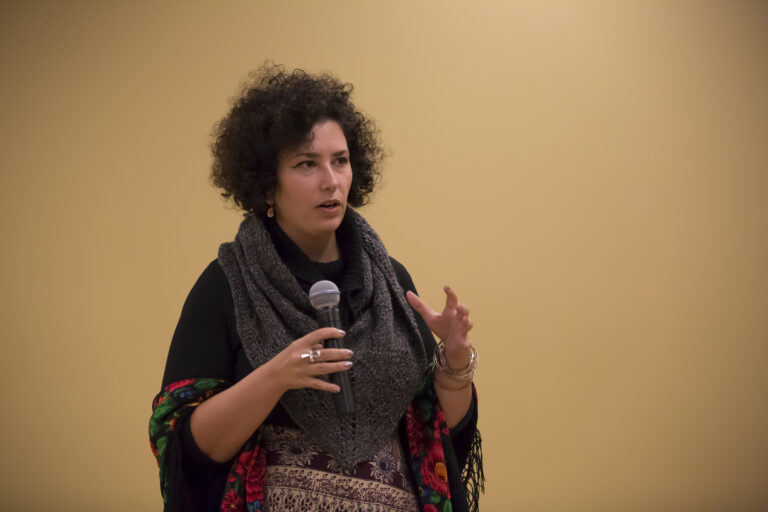In part 2, Walid Habbas provides a detailed account of Israel’s military operations in Gaza and its actions to separate Gaza into isolated areas with no public governance and little to no access to humanitarian aid. Not only is Netanyahu’s government holding up the flow of vital aid into the Gaza Strip, it is weaponizing the provision of limited aid in order to accelerate the breakdown of civilian structures and the mass starvation of Palestinians. A scholar on the unequal relations between Israel and the occupied Palestinian Territories, Walid Habbas also discusses the political landscape of Palestinian ruling parties and their conflicting positions regarding the path to Palestinian liberation.
How Israel Maintains Its Colonial Occupation – Walid Habbas pt 1/2
Talia Baroncelli
Hi, you’re watching theAnalysis.news, and I’m your host, Talia Baroncelli. This is part two of my discussion with Walid Habbas, where we get into the conditions on the ground in Gaza, as well as the legitimacy of the Palestinian Authority.
If you enjoy this content, you can give us a boost and support us by going to our website, theAnalysis.news, and hitting the donate button at the top right corner of the screen. Like and subscribe to the show wherever you watch or listen to your podcast, be it on YouTube, Spotify, or Apple, and make sure you’re on our mailing list. That way, you’re always up to date every time a new episode drops. See you in a bit with Walid.
Joining me now is Walid Habbas. He is a researcher at the Palestinian Forum for Israeli Studies, and he’s also a Ph.D. candidate. He just submitted his Ph.D. thesis at the Hebrew University of Jerusalem, where he’s been studying various economic relations between Israel and the West Bank, as well as the dynamics of oppression and occupation. I’m really excited to have you with me today, Walid.
Walid Habbas
Hi, Talia.
Talia Baroncelli
Well, several aid organizations have reported on the starvation in Gaza, and they’ve said that Israel is using starvation as a tool of war. Several hospitals have said that they’ve seen children die as a result of starvation. So, not just from being bombarded or from being shot up by the Israelis, but as a result of the mass starvation and malnutrition that has unfortunately taken hold of Gaza right now.
Of course, as a humanitarian catastrophe, the civilian infrastructure has completely broken down. There’s no possibility of redistributing some of the aid that’s coming in. Of course, Israel is controlling the aid trucks that are coming into Gaza, and not enough trucks are coming in through the Rafah Crossing, as you mentioned, but also into the north via the Kerem Shalom Crossing in the north of Gaza.
One other thing that’s happened is that they’ve also targeted the civilian policemen on the ground who were in charge of distributing the aid. So, there’s a breakdown of public governance.
We recently saw a horrifying incident in which 112 Palestinians were killed trying to get flour, what’s being called the Flour Massacre. The Israelis have a completely different account of what happened. They’re saying that most of these people died from being trampled and that they were not the ones who killed all of those people.
Of course, people on the ground are saying something completely different. They’re saying that the Israeli forces actually shot at them. The BBC has recently said that they analyzed the footage and that the footage that was released was not one unedited piece. It was four sections that have been released. It’s possible that that footage has been edited by the Israelis, so we don’t have the full account as to what happened. But obviously, the people on the ground are saying that they were targeted directly by the Israelis.
In any case, it’s clear that people are starving. There’s basically a famine that’s underway, and it’s the Israelis who are controlling the aid that’s coming in and have suspended funds to UNRWA as well.
Walid Habbas
Yes, of course. It is Israel that controls all the entrances to Gaza or the borders and prevents the aid from coming inside Gaza. But there is also another important issue related to this thing: Israel is focusing on who will distribute this aid. To drop food from the air would not solve the issue. It would complicate it more. The idea here is whether to enable large numbers of trucks full of aid to enter Gaza. The question here is, who controls these trucks and distributes them to the population?
It is, of course, the responsibility and the right of the local government, which is Hamas. It is not a question of allying with Hamas politically or not, but it is the government that governs Gaza. It is the one responsible for distributing this aid. Israel wants to cut this relation between Hamas as an administrative authority and the population and make this chasm between the population and the authority in order to isolate Hamas on the one hand and to give rise to other collaborative parties from within the population to collaborate with Israel and to constitute an alternative party to talk to Israel as to replace Hamas.
This is the main issue when we talk about the famine, the humanitarian aid, and the food. It’s a question of who distributes them. That is the main question. Dropping food from the air would complicate the issue and would, of course, ally with the Israeli agenda because when you drop it from the air, you can neglect the issue of who collects and distributes it because you distribute it and the places that you dropped the food were not selected randomly. They were selected by the air forces that dropped the food from the air very carefully in order to prevent the authority on the ground, which is Hamas, from taking advantage of this humanitarian aid and, on the other hand, to give to the people.
We should look more closely at how this air-dropping is being done. Going back to the humanitarian issue in Gaza, Israel, unfortunately, is unsuccessful in defeating the military opposition at Hamas. This is, of course, fortunate, but unfortunately, it is succeeding Israel in reengineering the space in Gaza.
Recently, Israel started to cut Gaza into two parts. The upper one-third, if you are familiar with the map, follows the route that is called the Nitzana Cross, which goes somewhere near the industrial area, which is in the Gaza industrial area, cutting the whole Gaza Strip and arriving at the Gazan port. This would make the city of Gaza cut and isolated from the other part, the Southern part of Gaza. This was established by a very huge, wide highway called Highway 749. Israeli military built tons of factories there to produce stones and to produce cement in order to pave this road. This road should be a benchmark where military bases, Israeli military bases, can spread around this road and make a direct and swift invasion here or there inside the Gaza Strip, but also to prevent the Gazans from returning to their homes.
This way, Israel is hoping to make two versions within the Gazan Strip. The northern version where it wishes to clean it up from Hamas and then give rise to collaborators from within the clans that were left in the northern part of Gaza and provide for the international community a new version that is not hostile to Israel, which Israel would collaborate and give more humanitarian aids, more money, allow them to reconstruct the northern part. The other southern part would be another example where if the Fedayeen or if the opposition exists, then the population would gain nothing and would remain living in ruins. This is the plan Israel is engineering now. Unfortunately, it has proceeded well in doing this.
Talia Baroncelli
Yeah, you’re speaking about what Netanyahu has in mind for the day after because it seems like, at least based on what you’re saying, that they’re trying to create a power vacuum in order to destroy the governing structures of Hamas on the ground and to selectively give aid to certain people, but not to everyone.
With the U.S. airdrops, for example, I think one airdrop is basically less than 25% of what a truck could actually bring in. It’s just very small amounts of aid that are not getting to the entire population.
If the goal is to try to make people distrust Hamas and to be fed up with them in order to turn to another governing authority, would you say that it would be more effective for the Israelis to perhaps live up to their promise of saying that they’ll keep civilians safe and maybe to evacuate them to safety into Israel for the time being?
Walid Habbas
Of course, no. Also, when we talk about the after plan, we should not learn only about this plan from what Netanyahu wrote in a page and a half. We can also look at what is happening on the land and analyze everything conducted day by day. Also, when we talk about Israel and protecting the civilians, we can put aside the rhetoric used by Israel. We look at the history, and Israel is an aggressive state. It is a colonial state. Israel doesn’t mind killing and eliminating all the Palestinians all at once. Of course, it cannot do this all of a sudden. This war repeated what we witnessed in the Nakba and onwards. Tens and hundreds of thousands of Palestinians were killed by the Israeli troops. Israeli military soldiers always rape Palestinian women, kill children, and make massive destruction to the urban scene the urban landscape. The genocide is not about how many causalities fill or how many shahids are in Gaza. Genocide is the act of destroying a nation. Preventing Palestinians from developing their economy, from developing their hospitals, this is considered a genocide. Israel bombarded a lab where… I don’t know what you call it in English. Men put spears in order to make babies because they are unable to. What do you call this?
Talia Baroncelli
Like a sperm bank, basically.
Walid Habbas
It’s not a bank. It’s a laboratory where they put this device in order to make babies.
Talia Baroncelli
Yeah, in vitro fertilization.
Walid Habbas
Israel has destroyed all these labs in Gaza. In this way, it prevented new babies. Preventing the birth of a new society, to prevent a society from natural growth, is considered genocide. Of course, we can add to that more than 30,000 people were killed in the destruction of Gaza. All of this is genocide. We need not stay on the level to prove whether Israel is hostile or not. It is the most aggressive state, and its army is the most unethical army in the world. This is not like something that we threw. This is what history has taught us during the last 78 years.
Talia Baroncelli
At the beginning of the interview, you also said that this is a different Israel. The Israel, of 1967, was following some international agreements and international law, and now the current Israeli government is so fanatical and even refers to, or at least parts of the coalition government refer to the West Bank as Judea and Samaria, and they use these biblical terms and have this complete disregard for international law. They want to continue building settlements in order to annex more of the West Bank.
Walid Habbas
I can give you one example of that. In 2019, U.S. Secretary [Mike] Pompeo said suddenly that the United States no longer considers the settlements an illegal project. Why is that? He added because we believe in the Israeli courts and the Israeli Supreme Court, if Israel wants to confiscate land in the West Bank, it makes, in a transparent way, like to make an announcement, allows the Palestinians to appeal to the court, it defends the rights of self property of the Palestinians. This is something very modern, very democratic, and that’s why whenever Israel confiscated land, we believe that it was confiscated, not against any Palestinian individual right.
This reflects that the previous Israel, he’s talking about the Bagatz in Hebrew, which is the Israeli Supreme Court, which has a long history of mixing between between the occupation and expansion appetite and between the international law in order to orchestrate all these settler colonial projects in a way that is digestible for the international community. It is doing that very slowly in order to take all these concepts. Now Israel is changing, and this Ashkenazi secular elite is moving away and is being replaced by very extreme religious biblical fractions. These fractions do not respect international law.
For instance, Netanyahu wanted to replace this position of the Israeli Supreme Court and produce another system of governance where Israel, as the executive authority, always had the upper hand. This way, he would be able to confiscate as much land as he wants from the West Bank, regardless of international law, regardless of Palestinian individual rights in ownership of the land. It is the public land, it is righteous to Israel. It’s a promise by God. It is not subject to courts or international law.
This type of Israel, and when we move to Gaza, they want to illuminate as much as they can from the babies, from the children, from the women, from anyone. They want to destroy; they want to transfer Palestinians.
The appeal that was presented by South Africa to the international court, if you read it, you will be shocked by the number of citations from the tongues of Israeli ministers and high-ranked officers about genocide. They want to be eliminated physically. I’m talking about physically. They want to eliminate the Palestinians as a nation, the Palestinian population. They’re not talking about Hamas or the military resistance. They’re talking about the Palestinians as a nation. This is the new Israel that we talk about now.
Of course, from a Palestinian point of view, it’s not different from the Israel that conducted the Nakba from 1948 to 1967. I’m talking about a new type of relationship emerging between this molester, which is called Israel, and the Palestinians, in a way that no party in the international community can protect the Palestinians or can dare and stop the Israeli appetite to eliminate the Palestinians. This is the new Israeli we talk about.
Talia Baroncelli
Yeah, this new Israel, as you said, Netanyahu orchestrated a judicial overhaul, and we did see large protests in Israel in opposition to this. That definitely affects the role of the executive and how they’re able to then overrule certain Supreme Court rulings.
Why don’t we turn to what the Oslo Accord set up, which is the Palestinian Authority? Netanyahu has boasted that he’s always been dedicated to preventing the emergence of a two-state solution. He’s gung-ho about ensuring that Oslo will basically be dismantled, that the legacy of Oslo will be dismantled.
Last week, we saw Prime Minister [Mohammed] Shtayyeh from Fatah, from the Palestinian Authority, resign. He was, I guess, a close right-hand man to Mahmoud Abbas, to the President of the PA. How do you see this resignation changing anything? Do you think there will be drastic changes? Mahmoud Abbas did say that he might appoint a World Bank economist, one of his other friends, I guess. How legitimate is the PA? Are they really a legitimate actor at this point?
Walid Habbas
If we go back to the Oslo Accords, we would not find any reference to the establishment of a Palestinian state in the Oslo Accords. The Oslo Accords, I mean all the accords, agreements, letters exchanged, and memorandums signed between 1993 and 2000, up to the Camp David Summit that had failed between Yasser Arafat and Ehud Barak, previous to the Arab breakup of the second Palestine entity. There’s no mention of the Palestinian state or two-state solution in the Oslo Accords.
The idea that Oslo would eventually lead to the establishment of a Palestinian state is a joke because Oslo was put in order to establish autonomy, a Palestinian Authority, which is called in the Oslo Agreement a Council, to administrate the social lives of Palestinians in specific enclaves within the occupied territories. These enclaves in the West Bank constitute only 40%. In the Gaza Strip after the withdrawal of the Israeli settlements and military from Gaza in 2005-2006, all of the Gaza Strip came under the administration of this autonomy authority.
I’m not sure how to address it. I can say that currently, there are two forces within the Palestinian political landscape. There is a resistance camp, and there is the Oslo camp. These are two contradictory camps that cannot, in any way, they cannot combine together or make any reconciliation between them. Never! I should explain why.
The Oslo camp is being funded and is being established, and its legitimacy is being given by Israel. It doesn’t have the autonomy to make its own decisions. Whereas the other camp, the resistance camp, is against Israel and wants to free the land. These are two opposite camps, and I don’t imagine that they can come together to form one single council. By the way, both camps do not represent all the Palestinians. But these are the salient camps, the vocal camps within the Palestinian political landscape.
This is the issue here. The majority of the PLO is captured by the United States and the Israelis, and Israel intervenes in everything that happens inside the PLO. Whether we like to hear this thing or we don’t like to, but the PLO now is an entity that entirely collaborates with Israel and cannot raise its voice against Israel, even when Israel is conducting genocide against the Palestinian people, which the PO, Palestinian Liberation Organization, should be the sole representative of these Palestinians. It is an inactive entity, but unfortunately, it is recognized by the international community as the sole and legitimate representative. No wonder why the international community sticks with the Palestinian Liberation Organization, the PLO, and, of course, the Palestinian Authority and Fatah. These are strong people on the ground. These are good friends to Israel. No wonder the international community recognizes the PLO as the sole legitimate representative of the Palestinians. As long as this representative of the Palestinians is dominated by the PLO and by Fatah, of course, I don’t think a reconciliation with Hamas could occur at any time.
Talia Baroncelli
You separate these two Palestinian elite within the political landscape as the resistance and Palestinian Authority. Do you see either one of those as being more positioned to secure the rights of the Palestinians or would you say neither of them?
Walid Habbas
Well, this is a political question, and I would not like to answer it because I don’t want to be affiliated with one party or another. I am describing what is currently happening in the Palestinian political scene. There are two parties. One is collaborating with Israel, entirely collaborating, and the other is resisting Israel. These are two different opposite agendas. They are being funded by different and opposing international or regional bodies, and there is no way that they can reconcile or they can meet together.
Who is really capable of defending Palestinian rights? Who is the good guy, and who is the bad guy? This is a political question. I think one should refer to surveys to learn what Palestinians think about that. When I talk about Palestinians, I talk about 12 million Palestinians because we have six million refugees outside the West Bank and Gaza Strip. These people also have a stake in this issue.
Talia Baroncelli
We should also point out that even though Israel is supporting and upholding the Palestinian Authority, Netanyahu has also been supporting Hamas with financial resources over the past few decades in order to prop them up. I think it was Smotrich in 2015 who said that Hamas is an asset and that [crosstalk 00:29:22].
Walid Habbas
Well, yes. The idea here is that after the Obama administration succeeded in making some negotiations between Mahmoud Abbas and Netanyahu, this was in 2014; before that, there were no political negotiations at all. Then, a very big question was raised over the heads of everybody in the world, so what’s next? What should we do with the Palestinian Authority? What is the destiny of the occupied territories?
The only escape for Netanyahu is to preserve and reproduce the Palestinian division in Gaza. This was the strategy between Netanyahu and all the governments, of course. It was not only Netanyahu because Netanyahu’s decisions are mainly based on the military and intelligence reports, and he consults with them. It is the state of Israel. The plan of the state of Israel was to preserve this dispute between Hamas and Fatah and between Gaza and the West Bank. How to do that is to strengthen Hamas, to enable Hamas to get more money in order to preserve this political division between both sides. In this manner, Hamas was an asset because it prevented Palestinian unity. If we don’t have Palestinian unity, we don’t have a party to talk to and make negotiations with.
In this manner, Netanyahu and all the Israeli leaders repeatedly said, “Of course, we adhere to a Palestinian state that lives side by side with Israel, but now we don’t have a partner. Look at the Palestinians. They have a division. They don’t have unity. We should wait.” But Israel, in fact, is fueling this division.
To Hamas, they can give some money, the Qatarian suitcase that enters with money, with dollars to Hamas. In Ramallah with Fatah, Israel has much smoother connections and can convince them not to make this conciliation with Hamas. In this manner, this was an asset.
But now, after the breakout of the war, Israel is standing in front of difficult questions. Are the Palestine going to unite again or not? If they are going to unite, is the issue of the Palestinian state going to rise again? How to deal with that? You should know that the situation in the West Bank, where there are now more than half a million settlers spread throughout the West Bank, this situation cannot be reversed by negotiation. This demands a war, frankly speaking. The position of the settlers and the religious Zionism within the Israeli society, and they succeeded to occupy the deep state inside Israel in a way that I can’t believe or imagine a scenario where diplomatic efforts can convince Israel to withdraw from the West Bank. We don’t imagine a Palestinian state without a war, unfortunately. We talked about the new Israel that considers the West Bank as the authentic heir to Israel.
Talia Baroncelli
Walid Habbas, it’s been really great speaking to you. Your insights have been really interesting, and I appreciate all the time that you spent with me to discuss these issues. So, thank you so much for joining me.
Walid Habbas
Thank you.
Talia Baroncelli
Thank you for watching theAnalysis.news. If you’d like to give us a boost and support us, you can go to our website, theAnalysis.news, and hit the donate button. Make sure you get onto our mailing list as well, and see you next time.
Podcast: Play in new window | Download | Embed
Subscribe Apple Podcasts | Spotify | Android | iHeartRadio | Blubrry | Email | TuneIn | Deezer | RSS
Never miss another story
Subscribe to theAnalysis.news – Newsletter
Walid Habbas is a researcher at the Palestinian Forum for Israeli Studies (MADAR) and a PhD candidate at the Hebrew University of Jerusalem. He is currently working on the West Bank-Israeli economic relationships with an emphasis on the multiple modes of interaction between Palestinian class-sectoral actors and the colonial structures: border and permit regimes. He is researching activities such as smuggling, labor migration, labor brokerage networks, logistic routes, and colonial economic interventions.
